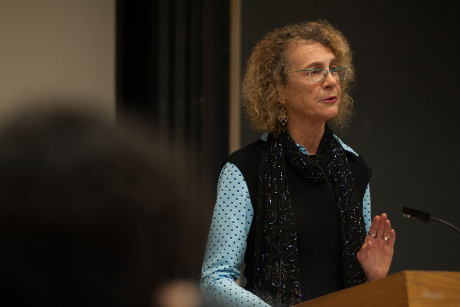Activist discusses anti-Islamophobia work
By Sascha Hernández

In recent years, there has been increasing scrutiny in New York City on Islamophobia and anti-Arab racism. From opposition to an Islamic Cultural Center near the site of the World Trade Center to anti-Islam ads in the subways, Islamophobia and its repercussions have taken center stage.
“The reality is that in the post-9/11 era, anti-Arab racism and anti-Muslim bigotry have become an entrenched feature of the landscape in New York City and nationwide,” said Donna Nevel, a Jewish-American community psychologist, educator and activist who has worked to fight bias and bring awareness to these issues among New York City’s Jewish community and the general public.
Nevel discussed her work in a talk titled “Combating Islamophobia in New York City: A Jewish-American Activist Shares Her Experiences” on campus Nov. 6. She is a founding member of Jews Say No!, a board member of Jewish Voice for Peace and a founder of the Jews Against Islamophobia Coalition (JAIC).
She said increasing awareness of Islamophobia is necessary to fight it, since many people who are not Muslim don’t recognize the many manifestations of Islamophobia when they occur. “One of the ways Islamophobia often manifests itself … is through dividing Muslims into two categories,” “good” and “bad,” she said. But, she said, this paradigm is pernicious because it imposes a litmus test and implies there is “potential culpability” among all Muslims and that being Muslim is something inherently negative.
Event organizer Satya Mohanty, professor of English, said Nevel’s research revealed how contemporary Islamophobia is not a spontaneous emotional response of ordinary Americans, but is instead heavily funded and carefully orchestrated. Nevel illustrated the point by passing out a list of the funding organizations and the amounts they have recently spent.
Nevel referenced Debbie Almontaser’s resignation as principal of the Khalil Gibran International Academy, an Arabic dual-language public school in New York, as an example of recent anti-Muslim discrimination that involved the “bad Muslim” label. Almontaser, an educator and a Muslim woman, was mired in controversy after opponents of the school incorrectly linked her to T-shirts that read “Intifada NYC” and accused her of holding radical beliefs. Following a New York Post article that misrepresented some of Almontaser’s comments, she was forced to step down by the Department of Education (DOE). The Equal Employment Opportunity Commission later determined that the DOE had discriminated against Almontaser “on account of her race, religion and national origin,” as reported in The New York Times.
Nevel discussed her community activism and outreach efforts, including handing out fliers on the street. When the JAIC holds panels or talks, she said, “we will not have a program where we only analyze and discuss the issues without addressing what we can do to respond.” Nevel emphasized the importance of “always thinking about whose voices matter” and “challenging ourselves at every step about how and why we’re doing what we’re doing.”
In response to a question about how fighting Islamophobia can lead to claims of anti-Semitism, Nevel responded: “We’re standing for justice; we’re actually speaking out about discriminatory and racist policies, and that’s not only not anti-Semitic, it’s an obligation for those of us who have any sense of ethics.”
The event was co-sponsored by several campus and community organizations.
Sascha Hernández ’17 is a writer intern for the Cornell Chronicle.
Media Contact
Get Cornell news delivered right to your inbox.
Subscribe